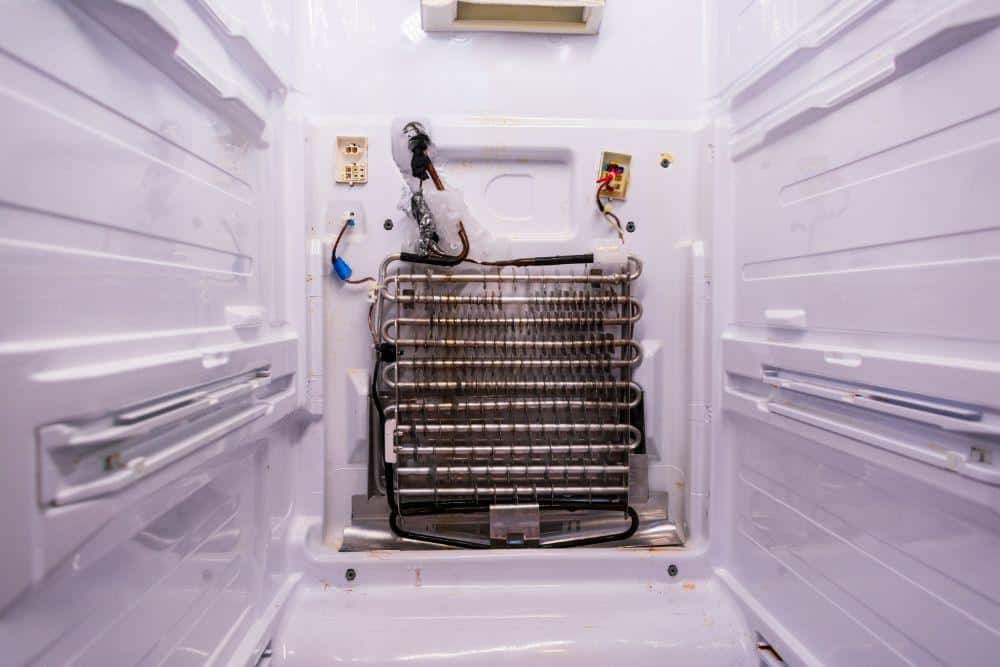Your fridge, freezer and air conditioner all require a refrigerant to keep things cold. Freon was widely used in various appliances to maintain a cool temperature. However, changes in regulations and a negative impact on the environment led to modifications in the industry.
Freezers manufactured after 2010 don't use freon anymore, thanks to the Clean Air Act.
This means if you have a modern refrigerator freezer, it's likely not using Freon for as part of its refrigeration system. There are alternative refrigerants that perform just as well that don’t have the same negative impact on the environment.
Before the 1990s, Freon was the primary choice for cooling systems in many appliances. Your freezer used Freon as a cooling agent to help maintain the freezing temperatures necessary to store your food safely. Notably, it was also used in a wide variety of cooling applications. This includes air conditioners and car cooling systems. Unfortunately, the environmental impact of freon has led to its discontinued usage.
Research has shown that Freon can cause significant damage to the ozone layer, contributing to ozone depletion. The ozone layer serves as a protective shield against harmful ultraviolet (UV) radiation. Increased exposure to UV rays can lead to serious health issues, such as skin cancer and eye damage.
Freon has more direct impact on health when inhaled. Refrigerant poisoning can be caused when inhaling Freon. Severe health problems, including respiratory issues and organ damage characterize refrigerant poisoning.
Global warming potential is also a concern with Freon. According to the state of California, one pound of Freon gas (R-22) has nearly the same effect as one ton of carbon dioxide.
The Environmental Protection Agency (EPA) has introduced regulations to phase out the use of Freon and promote safer alternatives. Modern freezers and refrigerators use alternatives to freon. These alternative refrigerants only minimally impact the environment and human health.
In order for a freezer to remain ice cold, it requires a mechanism to extract heat from the freezer and shed that heat to the surrounding air.
Freezers can use different types of refrigerants to keep the temperature low. Most modern lab-grade freezers use R404A refrigerant. Ultra-low temperature freezers use R508B as the secondary refrigerant (International Laboratory Freezer Challenge).
In the refrigerator compartment, cold air is circulated around your food, keeping it fresh but not frozen. The cold air is produced by the evaporator coil, which absorbs heat from the refrigerator's interior.
The freezer compartment is where you store food that needs to be kept frozen. Here, the temperature is even lower than in the refrigerator compartment. The US Department of Energy recommends a freezer temperature of around zero degrees Fahrenheit.
Condenser Coil
The condenser coil helps to remove heat from the freezer compartment. Condenser tubing is located between the inside and outside wall of the freezer.
The evaporator coil plays a crucial role in maintaining the ideal temperature inside the freezer. It absorbs heat from the inside of the freezer. This heat is transferred to the condenser coil, which is in turn shed to the outside air.
These components all work together to keep your food fresh and frozen. This allows for safe, reliable long-term storage. 
Evaporator Coils in a Freezer Compartment
So are there good alternatives to freon? Fortunately, the answer is yes. Advancements in refrigeration technology has led to much more environmentally friendly alternatives to freon.
Over the years, there have been significant advancements in refrigeration technology. As a result, new refrigerants have emerged as safer and more efficient options for use in freezers.
R-410A was broadly implemented as a freon alternative in freezers and refrigerators. However, it is currently being phased out to adverse environmental impacts. Many of these legacy refrigerants can only be used to service existing appliances. Newer fridges and freezers have to use more environmentally friendly refrigeration options.
The EPA's Significant New Alternatives Policy (SNAP) includes ecologically friendlier refrigeration and air conditioning alternatives.
Acceptable Refrigerants are continuously being scrutinized and updated - due primarily to their effect not on the ozone layer as was the case with Freon - but due to their GWP (global warming potential)
When you suspect your freezer uses Freon, be mindful of any signs pointing to a gas leak. Identifying a Freon leak early on helps to avoid potential health risks and damage to your appliance.
Freon can emit a chemical smell similar to nail polish. If you detect this smell, examine your freezer more closely.
Next, look for any visible residue on the floor surrounding your appliance. Freon leaks might leave a trace or discoloration near the freezer.
Here are some quick tips to help you spot Freon leakage:
If you suspect a freon leak, the best thing to do is call your local appliance repair person. They’ll be able to properly assess the situation and determine how to address the leak.
When handling freezers, follow these safety guidelines:
Proper Disposal
Dispose of old freezers the right way to prevent environmental harm. Some of the best guidance can be found at the energystar.gov website. Below are some tips and options to get rid of your older freezer and make sure it is disposed of in an environmentally responsible manner.
Due to its harmful effects on the ozone layer Freon (also called R-22), was phased out by manufacturers starting back in the early 1990s. Manufacturing of freon was completely banned starting on January 1st, 2020 in the United States.
To determine if your freezer uses Freon or another refrigerant, you can check the label or manual that comes with your appliance. Manufacturers typically mention the refrigerant type on this documentation.
No. You shouldn’t need to add freon or any other refrigerant to your freezer. Freezer refrigerants are designed to be a sealed system, meaning they should not require additional refrigerant over their lifetime. However, if you suspect you have a refrigerant leak call an appliance repair technician to fix the leak and ensure you have the proper level of refrigerant.
